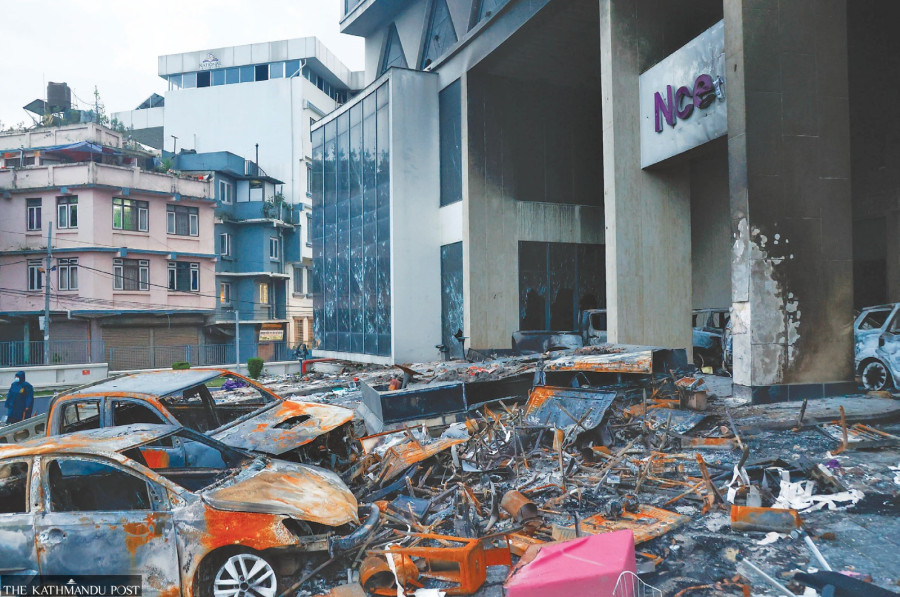Money
Police flooded with evidence as looting details emerge after Gen Z protests
Over 30,000 emails report widespread theft from banks, telecom offices, Parliament, and businesses.
Post Report
Nepal Police said it has been inundated with emails containing videos, photos, and eyewitness accounts sent by anonymous sources, all pointing to incidents of looting during the Generation Z protests last week.
The unrest, which engulfed major parts of the country on September 8 and 9, has left behind not only a political crisis but also one of the worst episodes of vandalism and theft in recent memory.
Deputy Inspector General Binod Ghimire, spokesperson for the Nepal Police, said more than 30,000 emails have been received so far, many of them with photographic and video evidence of mobs ransacking offices, shops, and private homes.
“We will form a team and conduct a thorough investigation,” Ghimire said.
The District Police Range, Kathmandu, has already appealed to the public not to buy looted goods and to remain cautious when making purchases, particularly jewellery and other valuables.
Police reports confirm that jewellery, gold, silver, and other assets were stolen from banks, financial institutions, private residences, and business establishments during the two days of violence.
Disturbing videos that went viral on social media show mobs storming shops, banks, auto showrooms, factories, and particularly Bhat Bhateni Supermarket stores, stealing goods in plain sight after setting buildings on fire.
Most government offices and private firms have since issued notices urging people to return looted items to the nearest police station, with some assuring that identities of informants will be kept confidential.
The Federal Parliament Secretariat said its inspection revealed theft of computers, printers, cameras, television sets, scanners, photocopy machines, speakers, microphones, monitors, and other office equipment.
The secretariat has formally requested the public to either return the items or provide information on those who took them.
Weapons looted from police stations during the violence remain a major concern. Both the Nepali Army and Nepal Police have appealed for their return, citing security risks.
Even essential services were not spared.
Nepal Telecom reported that more than 70,000 recharge cards were stolen from its regional offices in Pokhara. The company issued a public notice warning that SIM cards may be blocked as their serial numbers have already been tracked.
Ncell, the country’s largest private telecom provider, reported even more extensive damage. Its head office in Lainchaur and regional offices in Mahendranagar, Dhangadhi, and Pokhara were vandalised, looted, and set on fire.
Critical documents such as company certificates, land ownership papers, licenses, and cash were destroyed.
The company has lodged a complaint with the District Police Office, Kathmandu, submitting CCTV footage and photographs of those involved. Ncell has also urged people to return stolen items or face legal consequences.
The Civil Aviation Authority of Nepal (CAAN) said its Babarmahal office was looted, and an investigation is ongoing. It too has CCTV footage of the incident and has appealed for the return of stolen goods.
The financial sector has suffered the deepest scars.
According to onlinekhabar.com, Rastriya Banijya Bank alone reported losses amounting to Rs385 million, including 18 kg of gold and over Rs50 million in cash looted from different branches.
Its New Baneshwar branch was set ablaze, with gold and cash worth Rs360 million stolen. Protesters also looted its Bhairahawa customs branch.
The Nepal Bankers Association said more than five dozen bank offices across the country were attacked, with many ATMs vandalised and set on fire.
The business community has called the unrest a devastating blow.
Twenty-one of Bhat Bhateni’s 28 outlets were burned during the second day of demonstrations, while auto showrooms in Kathmandu’s Thapathali area were targeted by protesters.
Business associations including the Federation of Nepalese Chambers of Commerce and Industry (FNCCI), Nepal Chamber of Commerce, Confederation of Nepalese Industries, and Federation of Contractors Association of Nepal jointly urged the government to restore security and create an environment conducive for investment and trade.
The unprecedented scale of destruction has highlighted the fragile state of Nepal’s security infrastructure in the face of mass protests, according to the business community.
With thousands of stolen goods still unaccounted for, police are banking on public cooperation—and a growing trail of digital evidence—to track down those responsible.
Nepal is already struggling with sluggish growth and high unemployment.
The business community said that the destruction of businesses, the loss of investor confidence, and the undermining of financial institutions risks deepening the crisis.




 21.8°C Kathmandu
21.8°C Kathmandu













